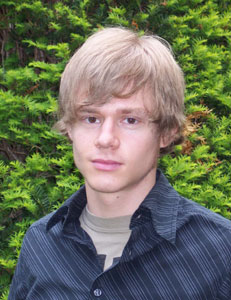FULBRIGHT SCHOLAR DIGS INTO SPAIN'S ARCHAEOLOGICAL HISTORY

Details
Emerson Avery '05 will be using his recently awarded Fulbright grant to conduct archaeological research in Spain next academic year—but not the way you might expect.
“I like the Indiana Jones films as much as the next man, and really appreciate the chance to get my hands dirty,” he says,“but the fact of the matter is that the pace of excavation always, always outstrips the pace of analysis and publication.” So while Avery will visit the excavation of Emporion, a Greek colonial site on the northeast coast of the country, the focus of his research will be on previously excavated objects and on writings produced by the colony's native citizens.“The sheer volume of material—indigenous, Greek, and Roman—to emerge from Emporion during its nearly 100 years of excavation is staggering.”
As an undergraduate, Avery majored in classics (specifically Greek) and classical and Near Eastern archaeology (at Bryn Mawr) with a minor in Spanish.“I discovered early on two powerful interests: in archaeology—history, really, to be general—and in languages,” he says.“The first I ever studied was Spanish, and I fell powerfully in love with it.” He spent the first semester of his junior year studying at the Universidad de Sevilla. While taking a Greek class to fulfill his major requirements, he also picked up a course on the use and development of technology in the Classical past, with examples drawn mostly from the Iberian Peninsula.“Though I had previously been interested in both Classical and Spanish history, it had never occurred to me to conflate the two,” he says.“Seeing such a rich presence in Spain was something of a revelation.”
Back at Haverford for the spring semester, he attended a meeting about various scholarships open to seniors (including the Fulbright) but had yet to draw up a solid project proposal. It wasn't until he returned to Spain that summer to participate in two digs (unrelated to Emporion) that he made the acquaintance of scholar Michael Blech, then head of the German Archaeological Institute in Madrid, and was struck with inspiration.“It was a comment he made regarding the lamentable invisibility of the native presence, and moreover a native voice, in Classical studies that gave me the idea I eventually turned into my project proposal.” Avery credits not only Blech for his invaluable assistance, but also fellow Iberian scholar Óscar GarcÃa Vuelta and Haverford Associate Dean Philip Bean:“His help, in reading drafts of my proposal and CV, in offering insightful criticism of weaknesses, and in providing me with his expertise in the vagaries of the Fulbright's application process, was essential.”
Avery will live in Madrid and expects his family to visit him from their home in Cortland, N.Y., in mid-January. While in Spain he plans to apply to graduate school, hoping eventually to pursue a Ph.D. in, and teach, archaeology or classics.“While the Fulbright gives me the opportunity to do something different from the norm,” he says,“I really do enjoy school, and look forward to going on.”
Sponsored by the United States Department of State, Bureau of Educational and Cultural Affairs, the Fulbright Scholar Program sends 800 U.S. faculty and professionals abroad each year to lecture and conduct research in a variety of fields.



